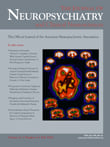To the Editor: The subtype of catatonia designated as delirious mania is characterized by excessive motor activity, combined with factors such as: unsystematic speech, disorientation, confusion, and psychosis, with acute onset of symptoms. Delirious mania is associated with bipolar disorder, and its symptoms encompass mania and acute mental confusion, when additional tests do not indicate other diseases. It was initially described by Calmeil
1 in 1832, but a subsequent case series published by Luther Bell
2 in 1849 described 40 patients with the condition among 1,700 admissions to McLean Hospital. Three-quarters of these patients died. Many authors have suggested that 15%–20% of all patients with acute mania show signs of delirium, contrary to the notion that it is not as common.
3 Patients with this syndrome experience significant morbidity
4 and a high rate of mortality without treatment.
Case Report
We report the case of a 42-year-old man diagnosed with bipolar disorder, initiated when he was 27 years old, who experienced irregular treatment due to living in a rural area. There was 1 year without treatment. He came to the emergency hospital with acute onset (7 days) of severe symptoms such as irritable mood, reduced need for sleep, pressured speech, racing thoughts, distractibility, fluctuating levels of consciousness, disorientation, disorganized behavior, extreme psychomotor agitation, pressured speech, hypersexuality, visual hallucinations, stereotypy, echolalia, echopraxia, tachycardia, rapid heart rate, and grandiosity.
We started treatment with lorazepam, up to 10 mg, without improvement. Lithium carbonate, 900 mg per day, also failed to cause improvement. After haloperidol, 10 mg/day, and thioridazine, 600 mg/day, the symptoms worsened, and he became more hostile and angry and experienced increased psychomotor activity, resulting in more weight loss and delirium. His laboratory studies, including CBC, CPK, serology for syphilis and AIDS, thyroid function tests, and renal functions, were within normal limits. A brain CT revealed no pathological findings.
After 20 days without improvement, we indicated ECT. After the third session, he was better, chatting adequately and sleeping from 6 to 7 hours per night. However, there were technical problems and the ECT was suspended. After 2 weeks, he began to gradually worsen. We started a treatment of olanzapine, up to 30 mg/day. After 2 months, the patient showed marked clinical improvement in his symptoms of catatonia and delirious mania. The response to ECT was much faster. He was maintained on olanzapine, 15 mg/day, and was referred to the outpatient clinic for psychiatric follow-up.

